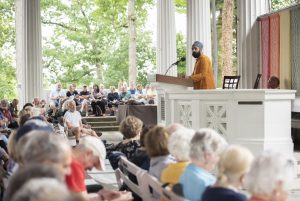
Simran Jeet Singh’s philosophy on divinity, theology and life in general is “whatever it is, it’s beautiful — whatever it is, it’s sweet.”
Singh, an author, activist and senior fellow at the Sikh Coalition, led Week Eight’s Interfaith Friday, joined in conversation by the Rt. Rev. V. Gene Robinson, Chautauqua Institution’s vice president of religion and senior pastor. Singh’s lecture tackled the question of theodicy through the teachings of Sikhism — a monotheistic religion from the Punjab region of northern India.
“Everything is real, everything is divine,” Singh said during his 2 p.m. presentation on Friday in the Hall of Philosophy. “We suffer when we are not able to see that truth. We are happiest when we are connected, when we see the oneness of the world around us and experience life as love. And we are most upset when we are disconnected, when we’re absorbed in ourselves, when we lose perspective.”
An accomplished scholar and “dad-joke teller,” Singh uses personal anecdotes, humor and pop culture to connect with people across issues of diversity, equity, race and religion. Singh is a regular commentator on NPR, “The Daily Show with Trevor Noah” and the BBC.
Additionally, he has authored three books: Covering Sikhs, a guidebook for journalists reporting on the Sikh community; a picture book on Fauja Singh, the world’s oldest marathoner, which will be published in 2020; and an adult nonfiction book on Sikh wisdom, forthcoming in 2021.
However, Singh’s relationship with his faith was not always easy; he grew up in Texas, and often found himself discussing his religion through the lens of Christianity, despite it being a rocky translation. Because of such Christian influences and belief in the afterlife — which Sikhism doesn’t emphasize — Singh began to question his religion.
“I had to come to terms with the idea that not all religions have the same points of focus, that they don’t all have to answer or even ask the same questions,” he said. “And (the afterlife) is not a central burning question in any sense within our tradition. And I came to believe that the Sikhs really focus on this life, as opposed to the afterlife, and that if you can achieve your maximum potential within this life, you can have joy and happiness — and that is salvation.”
From this realization, Singh was able to rationalize and deduce the question that’s plagued theorists and philosophers for centuries: If God is all-loving, all-powerful, benevolent and omnipotent, then why does evil exist?
Within Sikh tradition, Singh said, God is a “oneness,” and remains nameless in Sikh scripture and is rather referred to as the “beloved,” the “generous giver” or the “compassionate one.”
“To be fully in love is to be in union, to be there with integrity, right?” Singh said. “That, to us, is love, truth. All these qualities that come up over and over again in our scripture — that’s love. … God is absolutely love.”
God, in Sikh tradition, is also the divine creator. Singh recited a daily scriptual practice, which translates as: “You are the creator, the truth, my master. Whatever you wish, that is what happens. Whatever you give, that is what I receive. All belongs to you. All meditate on you. Whoever you bless, they receive the gem of connecting with you. … There is none other than you, the creatures and life forms, it is all your play. … You yourself are the creator; all happens through your doing. There’s no one except for you. Having created the world, you watch it, beholding it, understanding it.”
Then comes the third prong of theodicy: All things considered, why is there evil?
“The divine permeates absolutely every space within this world,” Singh said. “Just imagine divinity infused within every atom or molecule; that then helps you build up a sense of the world where God is equally present in myself and in you and in this podium and in this microphone. All is divine, nothing is sacred or profane, nothing is polluted, nothing is pure. And effectively, what happens there is, nothing is good or bad. Everything is divine.”
Objectively, Singh said, everything is divine; however, subjectively, people are not able to experience life in that way because the ego blinds people from recognizing God’s “oneness” and unity. Practicing love, recognition of oneness and selflessness removes the veil of ego.
Such egocentrism, he said, helps to understand hate-filled ideology like white supremacy, right-wing nationalism and xenophobia.
“They’re blinded by their own ego,” Singh said.
While self-inflicted evil can be explained away by egocentrism, evil not perpetrated by humans — like natural disasters — has a less satisfying answer without faith, according to Singh. Like Sikhism’s ambiguous answer to the existence of an afterlife, there are certain unexplainable phenomenons — “it’s a leap of faith and you accept it,” Singh said.
A post-enlightenment society is constantly expecting a single answer to every question, Singh said, but answering all of life’s peculiar questions is unsatisfying — it’s not the path to living a life of happiness.
“This is what it means to truly accept the divine order,” he said. “And it may not be rational and may not be explicable, it may not be something we can put into words, but it produces an entirely different mindset — and that is what Sikhism teaches.”




